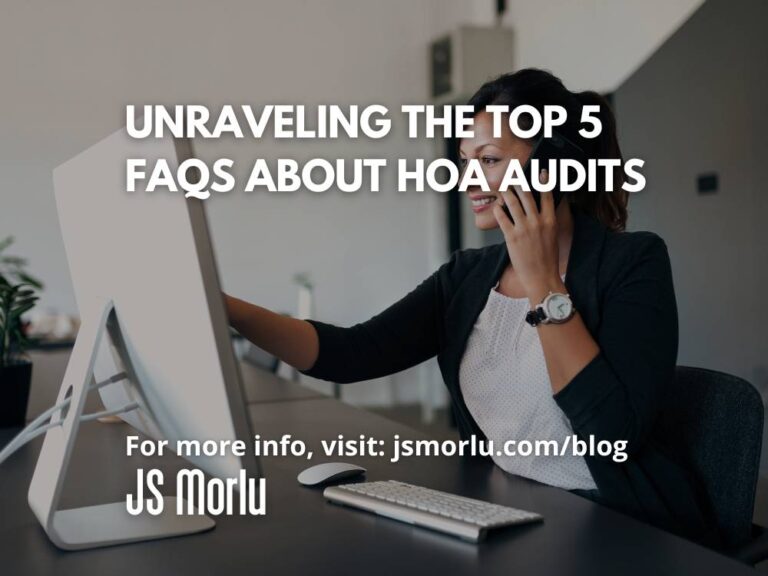Given the intricacies of HOA audits, here are the top 5 frequently asked questions that provide clarity on this essential financial process:
1. How much does an HOA audit cost?
The cost of an HOA audit varies based on factors like the association’s size and the complexity of its accounting and reporting environment. A typical audit fee falls in the range of $4,500 to $7,500.
2. What is an HOA audit?
In simple terms, an HOA audit entails a proficient Certified Public Accountant (CPA) conducting financial tests to acquire reasonable assurance that the financial statements are devoid of errors, commonly referred to as material misstatements. The goal is to provide a high level of confidence in the accuracy of the financial data.
3. When is an audit required?
Audits are often mandatory as per HOA bylaws, but state-level requirements can also dictate the necessity of an audit. Additionally, unusual circumstances such as board or management turnover may trigger the need for an audit.
4. What procedures are performed during an audit?
Audits involve the most extensive procedures compared to reviews and compilations. They encompass a comprehensive array of activities, including testing, examining financial accounts, conducting management inquiries, and employing analytical procedures to ensure a thorough financial assessment.

5. Is an audit worth it?
The value of an audit depends on the specific situation. Annual audits may be a legal requirement, leaving limited choice in the matter. However, even when not mandatory, periodic audits make sense to ensure the association has robust controls in place for accurate financial reporting. They provide a valuable layer of financial transparency and accountability.
Understanding these fundamental aspects of HOA audits helps demystify the process and empowers Homeowners’ Associations to make informed decisions regarding their financial assessments, compliance with legal obligations, and financial integrity.
6. What is the difference between an audit, review, and compilation?
Audits, reviews, and compilations are distinct levels of financial assessments. Audits provide the highest level of assurance and involve extensive testing, while reviews offer moderate assurance with fewer procedures, and compilations merely present financial statements without verification. Understanding these differences helps HOAs choose the right assessment for their needs.
7. How often should an HOA be audited?
The frequency of audits varies based on legal requirements, board discretion, and risk tolerance. Legal mandates, bylaws, and board preferences all play a role in determining how often an HOA should undergo an audit. It’s a balance between compliance, financial transparency, and cost considerations.

8. Can an audit detect fraud or embezzlement?
While audits primarily focus on identifying material misstatements in financial statements, they can indirectly uncover fraud or embezzlement. However, the detection of fraud is not the primary goal of an audit. If there are strong suspicions of fraud, engaging in a specialized fraud audit or agreed-upon procedures may be more appropriate.
9. What are the benefits of an audit for an HOA?
Audits offer numerous advantages, including enhanced financial transparency, strengthened internal controls, and the detection of material misstatements. They also help mitigate financial and legal risks, providing a high level of confidence in the financial integrity of the association.
10. How can an HOA prepare for an audit?
HOAs can prepare for an audit by ensuring that their financial records are organized and up to date. It’s essential to maintain accurate records, establish strong internal controls, and collaborate closely with the CPA to facilitate a smooth audit process. Being proactive in addressing any potential issues or concerns can contribute to a successful audit experience.
JS Morlu LLC is a top-tier accounting firm based in Woodbridge, Virginia, with a team of highly experienced and qualified CPAs and business advisors. We are dedicated to providing comprehensive accounting, tax, and business advisory services to clients throughout the Washington, D.C. Metro Area and the surrounding regions. With over a decade of experience, we have cultivated a deep understanding of our clients’ needs and aspirations. We recognize that our clients seek more than just value-added accounting services; they seek a trusted partner who can guide them towards achieving their business goals and personal financial well-being.
Talk to us || What our clients says about us


